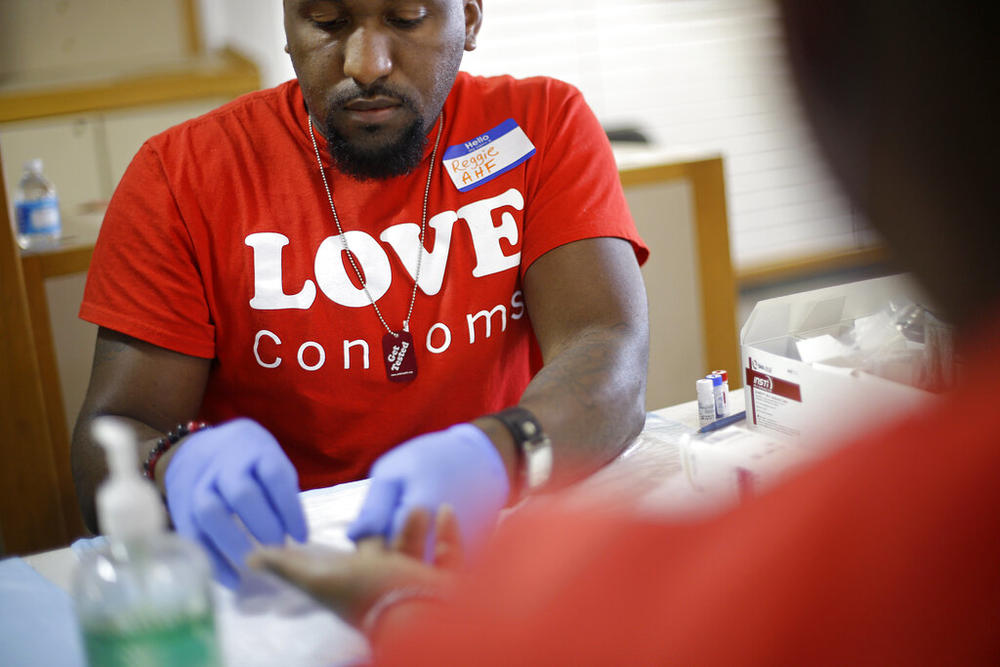
Caption
Reggie Batiste, left, program manager with AIDS Healthcare Foundation, administers a free HIV test as part of National HIV Testing Day, Thursday, June 27, 2013, in Atlanta.
Credit: AP Photo/David Goldman
A new partnership between the Morehouse School of Medicine and a pharmaceutical company will focus on access to medical care in the Black community. GPB’s Ellen Eldridge has more.

Reggie Batiste, left, program manager with AIDS Healthcare Foundation, administers a free HIV test as part of National HIV Testing Day, Thursday, June 27, 2013, in Atlanta.
Gilead Sciences Inc. is awarding $4.5 million in grants over the next three years to the Satcher Health Leadership Institute at Morehouse School of Medicine and Xavier University in Louisiana, with a particular focus on HIV testing, treatment and care.
The California-based biopharmaceutical company focuses on researching and developing antiviral drugs used in the treatment of HIV/AIDS, hepatitis B, hepatitis C, influenza, and COVID-19, which all disproportionately affect communities of color. Gilead was recently named the No. 1 overall philanthropic funder of HIV/AIDS programs by Funders Concerned About AIDS.
Disadvantaged and disinvested communities are disproportionately affected by public health crises, Gilead said in its recent report, HIV in the time of COVID-19: Leaving No One Behind to Truly End the HIV Epidemic.
Health care systems continue to fail to reach those most at risk, leading to heavier disease burdens and worse health outcomes, the report said, adding that "a truly effective public health response requires a deep recognition of the impact that pervasive inequities have on health and well-being, including HIV-related health outcomes and quality of life."
Daniel Dawes with Morehouse said the grant money will go toward addressing the social as well as the political determinants of health because these are the instigators when it comes to structural barriers that prevent underrepresented communities' ability to address their HIV care continuum needs.
Atlanta-based HIV researcher Dr. Melanie Thompson said she is not surprised at the disparity as it again appeared with the monkeypox outbreak in Atlanta.
"I wish I could say I was shocked by this; I'm extremely concerned about it," Thompson said. "But the most cynical part of me says it's just another day in Georgia."
She explained that the demographics of people with HIV who present with new HIV diagnoses, 73% are Black and only about 13% are white.
"The disproportionate impact on this community is no surprise, and it's been that way for decades," Thompson said. "But it is not really getting better. And monkeypox, again, raises the veil on the disparities that occur in our health system."
The Centers for Disease Control and Prevention put out a goal of reducing new HIV infections in the United States by 75% in 2025 and 90% in 2030.
"So, you know, when you think about it, we're in 2022," Dawes said. "We really have a lot to get done so that we can realize those really audacious goals to ending the HIV epidemic in the United States."
Data from the Georgia Department of Health found that there were 2,500 people in Georgia who were diagnosed with HIV in 2019, and there were almost 1,100 diagnoses of HIV or AIDS during that time period, Dawes said.
So, instead of slowing down the spread of preventable disease, Dawes noted cases were again rising.
"And so we recognized that, again, things were picking up," he said. "What were we going to do? We have limited research, understanding, (about) HIV, AIDS and COVID-19, for instance. What exactly is going on?"
To help with the problem of a lack of data, Morehouse partnered last year to launch of the Health Equity Tracker, a comprehensive data platform that can highlight and address the impact of COVID-19 and other diseases on the Black, Indigenous, Latinx, Asian, Pacific Islander, and other vulnerable and marginalized communities.
The Health Equity Tracker is the premiere Health Equity-focused data visualization solution, capable of tracking multiple conditions and determinants that have impacted COVID-19 outcomes and exacerbated health inequities. Built as a forward looking, scalable platform, the Health Equity Tracker can ingest multiple data sets ranging from social and political determinants of health, demographics, and other variables — resulting in a novel, comparative approach to assessing and conceptualizing health inequities.
"We are firmly about creating systemic change," Dawes said. "You'll see that as part of our health equity tracker, we don't have any data on HIV/AIDS yet, but we are hoping that this initiative is going to help us to basically get our hands on that data."
The goal is to create the data sets from which information can help communities who are impacted by the HIV epidemic as well as the ongoing COVID pandemic, he said.
Dawes said they want to make sure those at highest risk of contracting monkeypox also have what they need when they need it, so that they can more effectively advocate for desperately needed resources.
Thompson said public health is dramatically underfunded and understaffed and has been for decades.
"That really erodes our ability to handle these outbreaks," Thompson said. "And, you know, I think monkeypox shows us just how little we have learned from the disaster that is COVID that is still going on. Unfortunately, we have put Band-Aids in many places without building out the appropriate infrastructure that we need. So we need to focus on building out the infrastructure to handle these kinds of outbreaks, epidemics, pandemics."